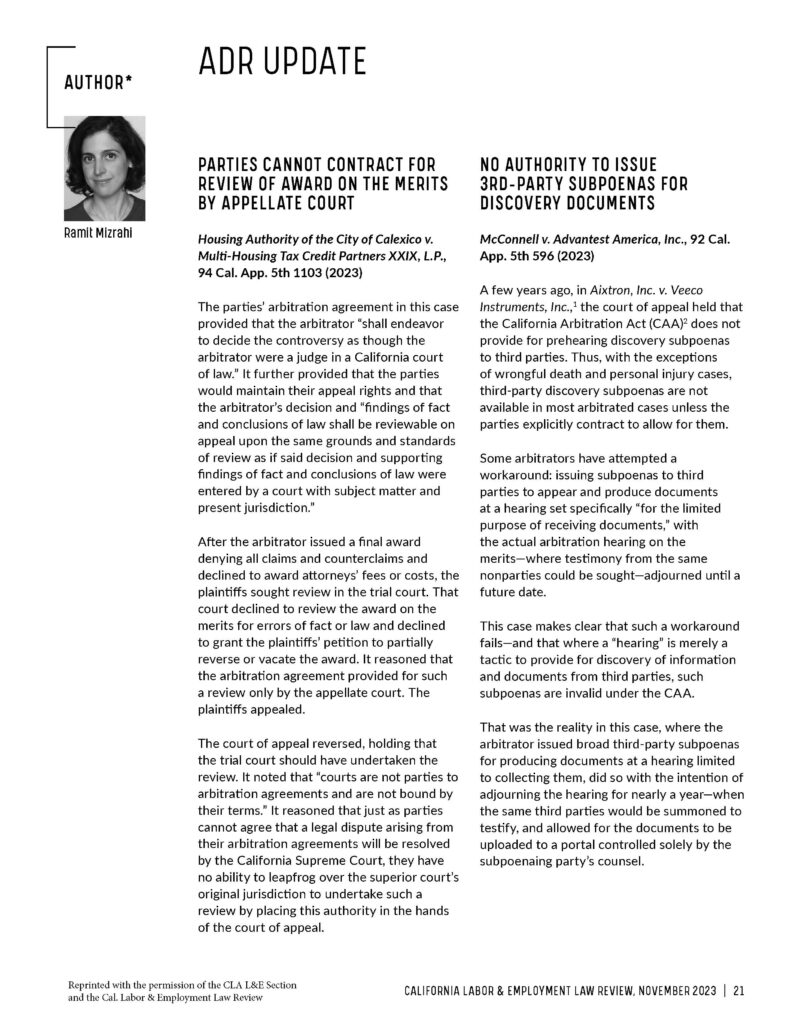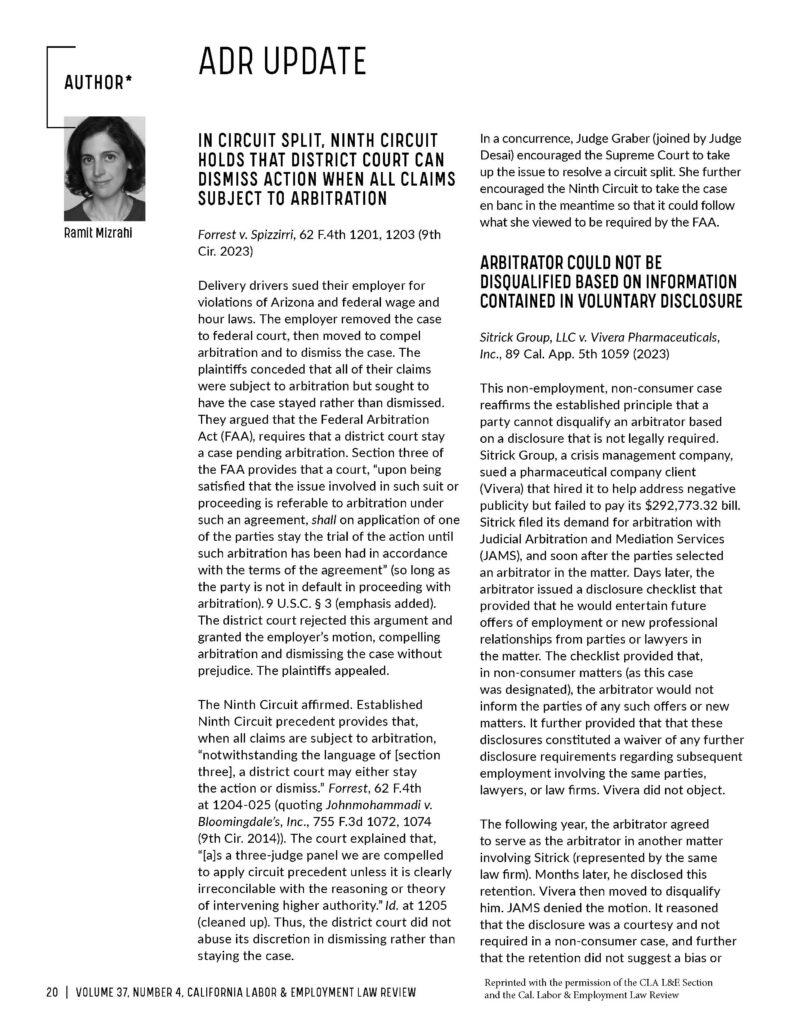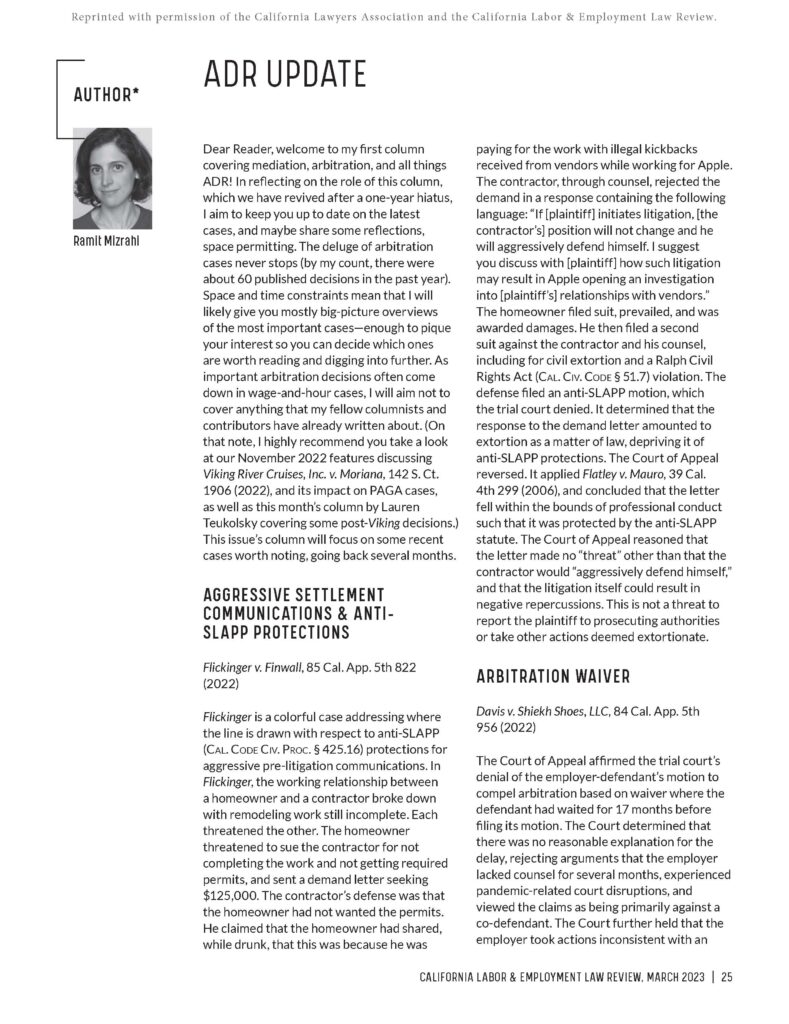-
31 Oct '23
Ramit Mizrahi’s November 2023 ADR Update in the California Labor & Employment Law Review has been published and can be found below.
-
01 Jul '23
Ramit Mizrahi’s July 2023 ADR Update in the California Labor & Employment Law Review has been published and can be found below.
-
04 Mar '23
Ramit Mizrahi has joined the California Labor & Employment Law Review as its latest columnist. She will be authoring its ADR Update column in every other issue (March, July, November), alternating with Hon. Michelle R. Rosenblatt (Ret.).
Her first column can be found below.
-

Update 9/15/21: On September 15, 2021, in Chamber of Commerce of the U.S., et al. v. Bonta, et al., No. 20-15291, 13 F.4th 766 (9th Cir. Sept. 15, 2021), the Ninth Circuit issued a ruling upholding most of AB 51. On October 20, 2021, the U.S. Chamber of Commerce filed a petition with the Ninth Circuit requesting a rehearing en banc, seeking to reverse this decision. That petition is currently pending before the court.
Update 1/7/2020: A federal district court has issued a temporary restraining order blocking enforcement of AB 51. A hearing is set in the case for January 10, 2020.
Update 10/10/2019: Governor Newsom signed AB 51 into law today.
The California Legislature is trying for a third time to protect workers from being forced to sign arbitration agreements. It passed Assembly Bill 51 (“AB 51”), which, if it becomes law, will: (1) prohibit employers from conditioning employment, continued employment, or any employment-related benefit on the applicant or employee waiving rights under the Fair Employment and Housing Act (“FEHA”) or the Labor Code, including the right to proceed in civil court; (2) prohibit employers from retaliating against an applicant or employee for refusing to waive employment-related rights; and (3) deem violations of these provisions as “unlawful employment practices” under the FEHA.
AB 51 follows in the footsteps of two nearly identical bills that then Governor Jerry Brown vetoed in 2015 and 2018. In his September 2018 veto message for Assembly Bill 3080 (“AB 3080”), Governor Brown expressed his belief that the bill ran afoul of U.S. Supreme Court precedent and “plainly violate[d] federal law.” He believed that California was preempted from interfering with the formation of arbitration agreements.
Proponents of the bill disagree with Governor Brown’s analysis and argue that AB 51 will survive judicial scrutiny. As reflected in AB 51’s bill analysis, they argue that it “simply gives the worker the option of whether or not to form the contract in first place,” and “nothing in AB 51 selectively calls out arbitration contracts . . . .”[1] They further contend that “[a]ll the bill does is say that an employee cannot be forced to sign an arbitration agreement, and if the employee elects not to, the employee cannot be retaliated against.”[2]
-
Senate Bill 707 is directed at employers who force employees into arbitration then refuse to pay the fees

On May 28, 2019, the California Senate passed Senate Bill 707 (“SB 707”), otherwise referred to as the Forced Arbitration Accountability Act. SB 707 seeks to end an abusive tactic that employers use to deny their employees justice—forcing them to arbitrate their legal claims and then suspending the process by refusing to pay the arbitration fees. The bill would pull employees out of this legal limbo by giving them options that allow them to proceed with their cases despite employer non-cooperation. SB 707 also aims to examine the alarming lack of diversity in the arbitration industry. It would require arbitration service providers to collect and share demographic data about the self-reported ethnicity, race, disability, veteran status, gender, gender identity, and sexual orientation of all arbitrators, as California judges are required to do.
1. OVERVIEW OF ARBITRATION
To understand the potential impact of SB 707, it is helpful to start with an overview of arbitration.
Arbitration is a form of private dispute resolution that takes place outside of the court system. In arbitration, an arbitrator—often a retired judge or lawyer—acts as both the judge and jury and renders a decision, which is generally final and binding. Employers are increasingly requiring employees to sign arbitration agreements and waive their right to a jury trial as a condition of employment. According to estimates from the Economic Policy Institute and the Center for Popular Democracy, almost 83% or 95 million of the country’s private, non-unionized employees will be subject to arbitration by 2024. These arbitration agreements are often buried in the fine print of job applications, employment agreements, or employee handbooks, and employees often only learn that they have signed arbitration agreements after-the-fact.
Arbitration generally favors employers. When employees are forced into arbitration, they are less likely to win their claims, and even when they do, they receive lower awards that employees who had jury trials.
One reason for this is that employers get to choose the rules governing the proceedings. The rules often make the process less favorable to employees, including by restricting discovery, limiting appeal rights, and prohibiting class actions. Discovery is the process by which each side formally obtains information from the other, including depositions (in which a party’s lawyer can examine witnesses under oath), interrogatories (written questions), requests for admissions, and requests for production of documents. In cases where an employee must prove that an employer acted with wrongful intent or discriminatory bias, the lack of meaningful discovery (for example, being denied the ability to take a sufficient number of depositions) can be fatal to an employee’s claim. (In some states, employers also use the rules to shorten the time that employees have to file their statutory claims (the statute of limitations) and to restrict legal remedies; this is not permissible in California.)
Another reason that the process favors employers is that . . .
Arbitration
Mizrahi Law, APC
- 35 N Lake Ave, Ste 710, Pasadena, California 91101
- dates@mizrahilaw.com
- (626) 380-9000
Client Testimonial
“I highly recommend Ramit Mizrahi. She has a winning combination of knowledge, passion, strategy, and empathy. She takes action and communicates updates promptly. Her professionalism is hard to beat. I’d give her 10 stars if I could!”
Latest News
- Ramit Mizrahi has been recognized as one of the Top 100 Super Lawyers and Top 50 Women Super Lawyers in Southern California in 2023.
- Ms. Mizrahi is being recognized in the 2023 Edition of The Best Lawyers in America©, published by U.S. News & World Report and by Best Lawyers.
- Ms. Mizrahi has been selected as a Top Attorney by Pasadena Magazine for 2023.
- Ms. Mizrahi is serving as Chair of the Pasadena Bar Association Labor and Employment Section.



